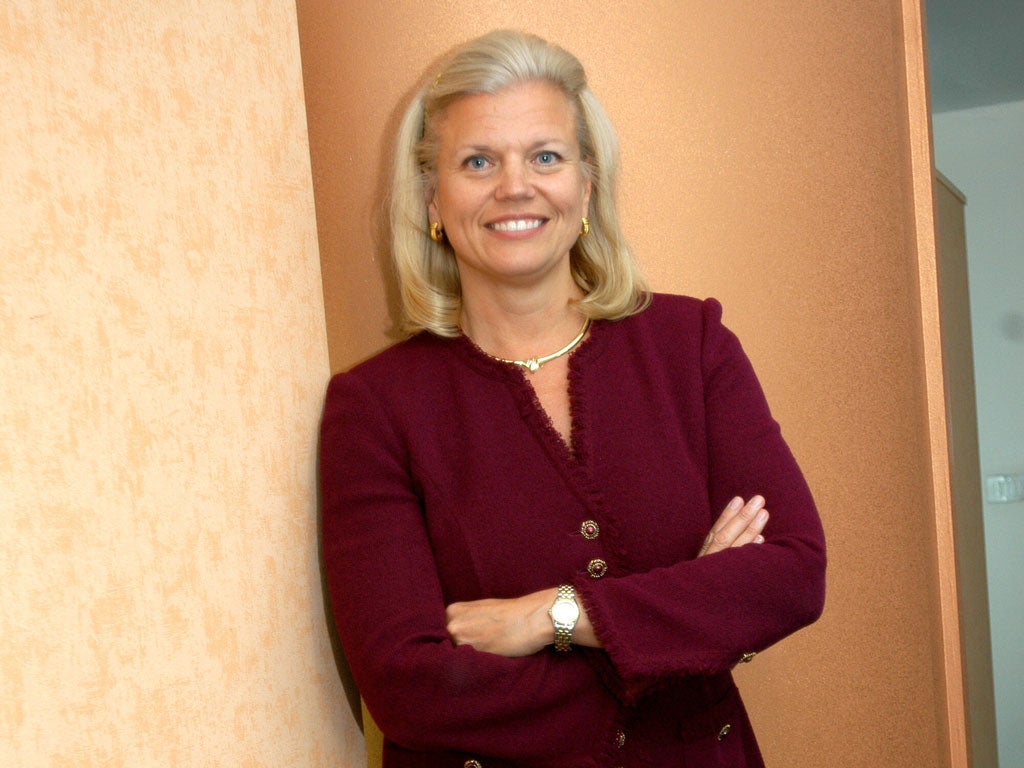The hot-shot and the Augusta old boys' club
The first female boss of IBM, Virginia Rometty, is a problem for America's most conservative golfers

Your support helps us to tell the story
From reproductive rights to climate change to Big Tech, The Independent is on the ground when the story is developing. Whether it's investigating the financials of Elon Musk's pro-Trump PAC or producing our latest documentary, 'The A Word', which shines a light on the American women fighting for reproductive rights, we know how important it is to parse out the facts from the messaging.
At such a critical moment in US history, we need reporters on the ground. Your donation allows us to keep sending journalists to speak to both sides of the story.
The Independent is trusted by Americans across the entire political spectrum. And unlike many other quality news outlets, we choose not to lock Americans out of our reporting and analysis with paywalls. We believe quality journalism should be available to everyone, paid for by those who can afford it.
Your support makes all the difference.At the start of this year, Virginia Rometty made US corporate history when she became the first woman to lead IBM. Whether she can break a separate gender barrier at a temple of American sport is another matter.
Next week, the Augusta National club in Georgia hosts the Masters, the most tradition-encrusted golf tournament on earth. IBM is one of the Masters' main sponsors, and each of its previous chief executives has been a member.
In the case of Ms Rometty however, there's a small problem. In its almost 80-year history, Augusta has never had a female member.
Women may play the hallowed Masters course, they may eat in the club dining room. But no woman has ever been invited to join (for an annual fee rumoured to be around $10,000 [£6,255]) and thus to receive one of the celebrated green jackets awarded to every Masters champion.
From the moment it opened, Augusta has been a golf club with a difference. Back in 1932, its founder Bobby Jones declared that he wanted to create "a golf course and a retreat of such stature, and of such excellence, that men of some means and devoted to the game of golf might find the club worthwhile as an extra luxury". In other words, it would be the last word in exclusivity – and by and large has remained so.
The list of Augusta's 300-odd current members is a secret. But this fortunate band is believed to include titans from the business world like Bill Gates and Warren Buffett, the two richest men in the US, as well as political grandees including the former Secretary of State George Shultz. As Jones intended, they are male and very wealthy, and also rather old: a list obtained by USA Today newspaper in 2004 revealed an average age of 72.
The club is steeped in the virtues and vices of the American South, of which it is an emblem. Deeply conservative, it is always slow to change its ways, and particularly so when the exhortations to do so come from the very suspect Yankee north.
Only in 1975 did Lee Elder become the first African-American to compete in the Masters (and received hate mail for his pains), and it wasn't until 1990 that Augusta admitted its first black member. Tiger Woods, a four-time Masters champion, has of course rendered moot any lingering complaints about racial barriers at Augusta. The ban on women, however, remains – though not for want of campaigns to overturn it.
The loudest of them, in 2002, was led by Martha Burk, then chair of the National Council of Women's Organisations. It included demands for a player boycott, and drew editorial support from that bastion of East Coast enlightenment, The New York Times.
But the effort came to nothing. It was simply too strident, some said, while others pointed to the fact that as a private club, Augusta could choose its own members. "We have a moral and legal right to organise our club the way we wish," said Hootie Johnson, the then chairman, declaring he would not be bullied "at the point of a bayonet". To underline the point, he even scrapped TV advertising by corporate sponsors of the Masters for a couple of years.
The message from his successor, Billy Payne, the organiser of the 1996 Atlanta Olympics, has been more polite, but essentially the same. Augusta, he said when he took over six years ago, had "no specific timetable" for admitting women. Ever since, he has maintained that membership issues are private.
But the ascent of Ms Rometty means the controversy has gained a fresh airing. Neither she nor IBM has commented on the matter – her preferred hobby is scuba diving. But it has been suggested she might end the debate now by declaring she has no wish to be a member.
Join our commenting forum
Join thought-provoking conversations, follow other Independent readers and see their replies
Comments